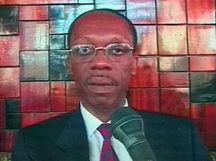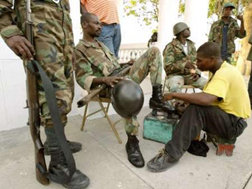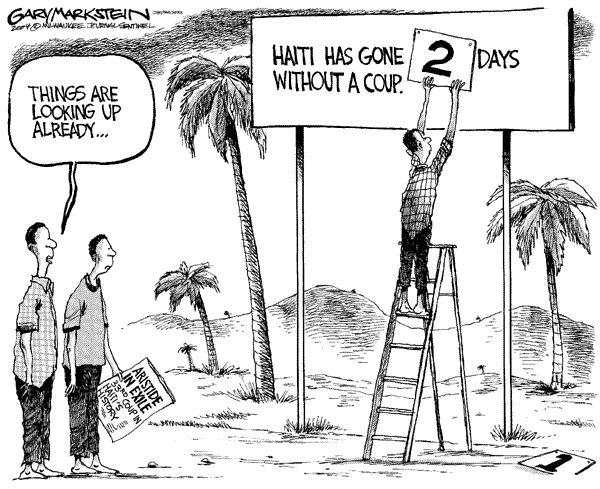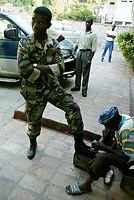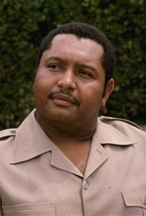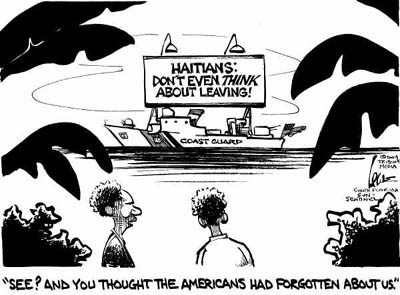|
March
2 04: Urgent from Haiti: Aristide's Safety in Danger! Upcoming Terror
in Haiti!
Translation to Arabic | Translation to most European Languages Past Updates
on Haiti
Ira Kurzban, the lawyer who represents President Jean Bertrand Aristide just told Pacifica Radio KPFK Los Angeles radio today that he had just learned that the Central African Republic (CAR) has shut off President Aristide's phone service. He said that armed members of the French and CAR military are guarding President Aristide and he is not free to leave! Aristide's safety is in danger! Civil rights activist Jesse Jackson, who arranged the AP phone interview with Aristide, said Congress should investigate whether the United States, specifically the CIA, had a role in the two-week rebellion that led to Aristide's exile. While US is denial there's anything to do with the Aristide's departure or the military coup leaders; tugs and former exiled Haitian dictator, are all want to claim the power of the "New" Haiti, such as: Exiled Haitian dictator Jean-Claude ``Baby Doc'' Duvalier, or Rebel leader Guy Philippe now declared himself the new chief of Haiti's military. The terror and the blood bath are coming again with the help of US and CIA in Haiti soon! The military coup and the US involvement in Haiti is just histoically, or for the past 20 years another chapter of racist and imperialist policy against the people of crarbian--as early as Monore doctaine of 1840. Furthermore, the neo-slave master of Haiti--the international sweatshops owners in Haiti, such as Disney, also played a direct role on the overthrown of President Aristide to protect their continue economic status. We are calling for every conscious, peace and justice loving activists across the world, to go to your local Federal building, US, France, Central African Republic and Haiti embassies for emergency protest. Or call the White House, the State Department and your local representatives to denounce this U.S.-engineered coup.
- Ramsey
Clark On Haiti: "A Clear Demonstration of U.S. Regime Change By
Armed Aggression"
- EXCLUSIVE: U.S. Psy-Ops Exposed, South Africa Rejects Washington's Claim Aristide Was Denied Asylum - Black Caucus Vows to Find Out if U.S. Engineered Coup Against Aristide - Head of U.S. Security Firm That Guarded Aristide Speaks Out
Latest News from Haiti: Analysis, Commentary: Take Action!
1) Breaking News on Haiti
Contact: Pacifica Radio KPFK 90.7 FM Tel:-818-985-2711 EXT 203
March 2, 2004 2) Haiti rebels threaten more strife
CNN March 1, 2004 Supporters of Haitian rebel leader Guy Philippe burned paintings from the country's former army headquarters Tuesday as Philippe declared himself the country's new police chief and threatened to arrest Prime Minister Yvon Neptune. "We have the base of the police with us," he said. "Almost 90 percent of the police are with us now, working together and trying to take the right decisions." Philippe also demanded the surrender of 20 men he said were leaders
of armed gangs loyal to Haiti's exiled president, Jean-Bertrand
Aristide, and he called for the country's interim president to re-establish
Haiti's army. There was no immediate comment from the government of interim President Boniface Alexandre. In Washington, Vice President Dick Cheney said he is happy that Aristide is out of office -- but he denied Aristide's accusation that the United States forced him from power. Meanwhile, a U.S. State Department spokesman said the United States would not recognize Philippe as head of Haiti's national police. And Haiti's longtime dictator, Jean-Claude "Baby Doc" Duvalier, told a Miami television station that he wants to return to his homeland but denied he is interested in seeking the country's presidency. After his supporters entered Port-au-Prince on Monday, Philippe set up shop in what was once the headquarters of Haiti's armed forces. Under Aristide, the building was Haiti's ministry for women's affairs. Philippe's supporters pulled paintings out of the building, located across from the presidential palace in Port-au-Prince, and tossed them on a bonfire Tuesday afternoon. U.S. State Department spokesman Richard Boucher said Washington did not recognize Philippe's claim to authority and called on the rebels to lay down their arms. "There is an orderly and constitutional political process under way in Haiti," Boucher said. "That process needs to be respected by all Haitians, but we're glad to see the violence in decreasing. But the rebels have no role to play in this process and they need to lay down their arms and go home." Boucher said there was a distinction between the democratic opposition groups seeking a role in a new Haitian government and "groups that perpetrated violence so widely and broadly against the Haitian people in recent weeks." "We all know that these various individuals involved in this
armed violence, many of them have a very unsavory "This time, we won't take this pressure," he said. "If they want to kill me, they can come and kill me. I'm ready to die for my country." Philippe called on the interim president to re-establish the Haitian army, though he acknowledged that restoring the military would take time, and he called on the international community to assist in its reconstitution. Haiti's armed forces overthrew Aristide, the country's first democratically
elected president, in 1991, and the United States restored him to
office in 1994. Aristide says he was forced out of Haiti in a "real coup d'etat" led by the United States, in what he called a "modern way to have a modern kidnapping." "I was told that to avoid bloodshed I'd better leave," he said in an interview on CNN Monday. The leader of the Central African Republic called his decision
to grant asylum to Aristide, "a humanitarian act" but
in a statement released Tuesday also expressed solidarity with Haitians
who are trying to rebuild their government. In an interview Tuesday with CNN's Wolf Blitzer, Cheney said that accusation is "simply not true." But he added, "I'm happy he's gone." "I think the Haitian people are better off for it," he said. "I think they now have an opportunity to elect a new government, and that's as it should be." U.S., French and Canadian troops have been dispatched to Haiti to restore order after Aristide's ouster, and a U.S. Marine contingent moved to secure the capital's seaport Tuesday. The United States has warned the interim government that "violence will not be tolerated," the State Department official said. "So far it is working," the official said, adding, "We have made clear to the rebels they need to be part of the solution, not part of the problem." Meanwhile, Duvalier -- whose family ruled Haiti from 1957 to 1986 -- told Miami television station WFOR that he wants to return to his homeland as soon as possible. Duvalier has lived in exile in France since his overthrow in 1986. He said he requested a diplomatic passport several weeks ago, while Aristide was still in power. Asked if he plans to return to Haiti to run for president, Duvalier said, "That is not on my agenda." -- CNN Correspondent Lucia Newman and producers Ingrid Arnesen and Elise Labott contributed to this report. 03/01/2004 19:18 GMT-5 3) Rebel Says He's New Haiti Military Chief
the parking lot of a hotel in Cap-Haitien, Haiti, on February 25, 2004. PORT-AU-PRINCE, Haiti (AP) - Rebel leader Guy Philippe on Tuesday
declared Flanked by other rebel leaders and senior officers of Haiti's police
force, ``I am not interested in politics,'' he said. ``The president is
the legal Later Philippe said he would use his new self-ascribed powers to
arrest But a U.S. government official discounted Philippe's potential
for leadership ``He is not in control of anything but a ragtag band of people,''
said The buildup of the international presence in Haiti will make Philippe's
role Philippe also said the rebel forces that participated in the uprising
that Haiti's Supreme Court Chief Justice Boniface Alexandre was installed
as Exiled Haitian dictator Jean-Claude ``Baby Doc'' Duvalier, meanwhile,
said he ``This is my country,'' Duvalier told Miami's WFOR-CBS4 television
in an But Duvalier said he doesn't plan to run for president. ``That is not on my agenda,'' he said through a translator. The deposed dictator said he requested a diplomatic passport several
weeks ``I think I'm getting close and that I will soon have the opportunity
to go Duvalier had been named president for life at age 18 after the
death in 1971 Accused of human rights violations and stealing at least $120 million
from Philippe, a former provincial police chief during Aristide's tenure,
has said Human Rights Watch has said Philippe has a ``dubious human rights
record,'' Aristide, currently in the Central African Republic, told The Associated
American officials dismissed Aristide's claim. Secretary of State
Colin Backtracking from earlier comments, French Defense Minister Michele
``There have been French troops in the Central African Republic
for several But their mission ``has nothing to do with the presence of President
Aristide and the president of the Central African Republic, Francois
Bozize, U.S. plans for a quiet, orderly transition in Haiti appeared threatened,
At least 100 people have died in the uprising that erupted Feb. 5. Meanwhile, the prospect of peacekeepers - the other arm of U.S.
strategy - The civilian opposition also raised concerns about an orderly transition
when The only encouraging sign was the relief among people in the capital. Callers flooded talk radio programs with appeals for rebel help
in Scattered looting continued, police cleared the city of barricades,
but In the capital, there were reports of reprisal killings of Aristide
Powell said he did not want some rebel leaders to take any role
in a new ``Some of these individuals we would not want to see re-enter civil
society Amnesty International called Monday for international peacekeepers
to arrest Chamblain said the rebels planned patrols Tuesday, possibly to
the Cite Defense Secretary Donald H. Rumsfeld estimated that between 1,500
and 2,000 Chile said it was sending 120 special forces to Haiti on Wednesday,
the first There were no clashes between the rebels and the American and French
troops, Aristide's home in suburban Tabarre, meanwhile, was looted and
trashed, but Aristide abruptly left Haiti early Sunday and was flown aboard
a contracted With rebels closing in on the capital, Aristide may have felt his
life was in Civilian opposition leaders met with rebels for hours at a Port-au-Prince
Associated Press reporters Michael Norton in Kingston, Jamaica;
Mark 03/02/04 14:41 EST 4) Exiled 'Baby Doc' Seeks Return to Haiti
MIAMI (AP) - Exiled Haitian dictator Jean-Claude ``Baby Doc'' Duvalier
told a ``This is my country,'' Duvalier told WFOR-CBS4 on Monday in an
interview in But Duvalier said he doesn't plan to run for president. ``That is not on my agenda,'' Duvalier said through a translator. The deposed dictator said he requested a diplomatic passport several
weeks ``I think I'm getting close and that I will soon have the opportunity
to go Duvalier also said he was not involved with the rebels who helped
force He applauded the ``prompt action of the international community,''
welcomed But Reed Brody, special counsel for the group Human Rights Watch,
said: ``His dictatorial regime was responsible for thousands of political
killings Duvalier had been named president for life at age 18 following
the 1971 death 03/02/04 14:47 EST 5) US Rejects Haiti Rebels' Power
Bids
By SONYA ROSS .c The Associated Press WASHINGTON (AP) - The Bush administration rejected on Tuesday bids for power in Haiti by rebels and insisted they lay down their arms and return to their homes. There is a political process under way to pick up after the departure of President Jean-Bertrand Aristide and ``the rebels do not have a role in this process,'' State Department spokesman Richard Boucher said. ``The rebels have to lay down their arms and go home,'' Boucher said in rejecting a declaration by rebel leader Guy Philippe that he had become the new chief of Haiti's military and other assertions of power by other rebels. Roger Noriega, the assistant secretary of state for the region, said of Philippe: ``He is not in control of anything but a ragtag band of people.'' The buildup of the international presence in Haiti will make Philippe's role ``less and less central in Haitian life,'' Noriega told the Senate Foreign Relations Committee. ``And I think he will probably want to make himself scarce.'' Asked when that would be, Noriega said within the next few days. ``We have sent that message to him. He obviously hasn't received it.'' The Bush administration, meanwhile, tried to set aside the controversy over Aristide's departure from Haiti, expressing little interest in his claims that he was forced to go into exile by the American military. ``I think the story's been addressed,'' White House press secretary Scott McClellan said, referring to emphatic administration denials. ``The decision to leave was Mr. Aristide's to make.'' Aristide's resignation letter said he was leaving ``in order to avoid a bloodbath,'' according to a U.S. translation from Creole. ``I accept to leave, with the hope that there will be life and not death.'' A copy of the letter was provided by the Bush administration. But Sen. John Kerry, D-Mass., the front-runner for the Democratic nomination for president, said he thought there ought to be some investigation of the claim that Aristide was forced out and escorted by U.S. troops. ``I don't know the truth of it. I really don't,'' Kerry said on ``Today'' on NBC. ``But I think it needs to be explored and we need to know the truth of what happened.'' McClellan responded to Kerry by launching a fresh attack on Aristide's leadership. ``It was Aristide's failed government that empowered armed gangs to control the country,'' McClellan said. ``It was a failed government that condoned official corruption, including drug trafficking. it was a failed government that engaged in acts of political violence against a peaceful democratic opposition.'' The spokesman declined to say what evidence the administration has to support his claim that Aristide's government condoned drug trafficking President Bush called President Jacques Chirac of France and President Luiz Inacio Lula da Silva of Brazil to review developments in Haiti. McClellan said U.S. officials were not trying to contact Aristide. ``There are some absurd accusations that some are choosing to repeat and they do nothing to help the Haitian people through this difficult period,'' McClellan said. Black lawmakers and others demanded an investigation into the way the administration treated Aristide in the hours before he left his country and turned up in the Central African Republic. They built their objections around repeated claims by Aristide that U.S. officials forced him out. With Aristide gone, and rebels who brought him down inside Port-au-Prince, Haiti's capital, the first significant U.S. military presence began arriving Monday. The Pentagon said as many as 400 Marines were there, with hundreds more to come. As many as 2,000 U.S. troops could eventually go to Haiti to help curb the chaos, but Defense Secretary Donald H. Rumsfeld said U.S. troops would remain in Haiti only for a short time. An interim international force that could include up to 5,000 troops from France, Canada and elsewhere was expected to stay until replaced by a U.N. peacekeeping force. Aristide told The Associated Press that his resignation was coerced. He said U.S. agents who came to his home ``were telling me that if I don't leave they would start shooting and be killing in a matter of time.'' It was unclear whether Aristide meant that the rebels or U.S. agents would begin shooting. ``I was forced to leave,'' Aristide said in a telephone interview from Africa. Secretary of State Colin Powell and Rumsfeld denied that, but U.S.
officials acknowledged privately that Aristide was told that if
he remained in Haiti, U.S. forces would not protect him from rebels
who wanted him put on trial on allegations of murder and corruption. 6) Did U.S. Push or Pull Aristide from Power?
As rebel leader Guy Philippe declared himself Haiti's "military chief" Tuesday, speculation continued to fly over the U.S. role in deposed president Jean-Bertrand Aristide's flight from power Sunday. MONTREAL, Mar 2 (IPS) - As rebel leader Guy Philippe declared himself Haiti's "military chief" Tuesday, speculation continued to fly over the U.S. role in deposed president Jean-Bertrand Aristide's flight from power Sunday. More than one observer suggested that now that the champion of the poor in the western hemisphere's poorest nation was gone, it was time to look ahead to rebuilding -- but first to disarming the various armed factions in Haiti. On Monday, Aristide told CNN (the Cable News Network) that U.S. soldiers forced him to board a plane that landed in Africa 20 hours later. "I called this a coup d'etat the modern way, to have a modern kidnapping," said Aristide. "We had to leave and spent 20 hours in an American plane not knowing where they were going with us until they told us 20 minutes before we landed in the Central African Republic". U.S. Secretary of State Colin Powell denied that version of events. Aristide "was not kidnapped", Powell said. "We did not force him onto the airplane. He went onto the airplane willingly. And that's the truth," he told reporters Monday. Hours after Aristide's flight, the United Nations Security Council authorised a multinational intervention force for the country. On Tuesday, U.N. Secretary-General Kofi Annan said he knew nothing more about Aristide's departure, adding, " I hope this time the international community will go in for the long haul and not a quick turn-around . it may take years and I hope we will have the patience to do it". Tuesday morning a spokesman for the Caribbean Community (CARICOM) told the Canadian Broadcasting Corporation (CBC) he did not think the anti-Aristide rebels joined with Washington to depose the embattled leader. "A lot of people are making the link from the rebels to the United States and saying the United States had a role in him (Aristide) being forced out. Do you make that link?" the CARICOM spokesman, Jamaican Foreign Minister KD Knight, was asked. "No, I haven't made that link. I've heard that link being made but I haven't made it. We are just going on what's happened on the ground, what's evident to all onlookers, the behaviour of the rebels, the behaviour of the opposition," answered Knight. CARICOM criticised the world community last week for not sending a military force to Haiti sooner, and Knight suggested Tuesday the group might not recognise a governing authority in Haiti -- one of 15 CARICOM members -- that included the rebels. The regional body was to meet Tuesday to discuss how to officially react to the events in Haiti. One non-governmental observer said the international community will likely make no meaningful contribution to the island country, even now that Philippe -- a former policeman and army cadet who fled the country after a failed coup attempt against Aristide in 2001 -- and other known human rights violators appear to have assumed some power. "The international community, by which we mean in the case of Haiti the United States, France and to a lesser extent Canada, have already made it absolutely clear that they're not going to intervene in any positive way in Haiti," said Charles Arthur, director of the UK organisation, Haiti Support Group. Instead, the role of the international armed force "will be to protect whatever assets the international community believes it has, which in short will be the main infrastructure of the capital, the embassies, the big businesses, the areas where the rich people live . the basic infrastructure of the country", he added. "The peacekeeping, the law and order, in a de facto fashion, will be the preserve of whoever is in charge of the Haitian Army and the Haitian police force, which it looks like is going to be Guy Philippe," said Arthur. But Tuesday, U.S. State Department Spokesman Richard Boucher rejected Philippe's claim. "The rebels have to lay down their arms and go home," said Boucher, according to Associated Press (AP). Arthur argued the world should not mourn the departure of Aristide. "Clearly the United States is the main player in getting him to leave. Whether the left and progressive forces all over the world should be focussing on the issue of the Aristide presidency, I don't think so". "In my opinion, based on working with grassroots organisations in Haiti over the last 12 years, Aristide hasn't been able to deliver the demands and aspirations of the 85 percent of (the people who are poor) in Haiti. And this is one of the reasons why it was possible for the United States to remove him from power," according to Arthur. Haitian politics has been blocked since the opposition parties refused to participate following 2000 elections that rights groups and bodies like the Organisation of American States (OAS) declared flawed. But more than one week ago, and with Philippe and other heavily-armed rebels advancing on the capital Port-au-Prince from the north, Aristide agreed to a CARICOM action plan that would see him stay in office until his term ended in 2006 as part of a power-sharing government with the opposition. But his opponents refused to accept the strategy. "I think they (the United States) facilitated his leaving certainly, but I don't think the United States was responsible for his leaving," said Carolyn Fick, a professor of history at Montreal's Concordia University. "There were negotiations and they put pressure on Aristide but so did the internal situation in Haiti put pressure on him, in spite of his declaration to the contrary," added Fick, author of 'The Making of Haiti: The Saint Domingue Revolution From Below'. "He's gone but the point is now, where to go. I think that it has to be a civil and political solution. The rebels have not put down their arms. They promised to do so -- they haven't. I don't think they will until they get guarantees. My feeling is that they're going to negotiate for the restoration of the Haitian Army." According to another observer, "I don't think anybody knows exactly what occurred. It's clear that there was a tremendous amount of international pressure put on Aristide and in the end I don't know what finally convinced him to leave; whether in fact he had been trapped or whether he was convinced simply to leave because his life was at stake and the lives of so many thousands of other people might have been at stake". Added Leslie G. Desmangles, a professor of international studies at Trinity College in Hartford, "(Aristide) left and the question as to whether he was taken away or whether he left on his own I think at this point is rather moot, because what's important at the moment is that he's gone and that now we have to look forward to reshaping the politics and the government of the country". That tremendous task will have to begin with basic services. For example, aid group Oxfam said Tuesday "at least 80,000 people in Port de Paix and 60,000 people in Cap Haitien (both in the country's north) have no access to clean water, many others are short of food and the threat of disease due to poor sanitation is growing". Groups stopped delivering aid because of insecurity earlier this month, and "lack of access to sufficient quantities of clean water combined with the general lack of adequate sanitation could soon lead to disastrous outbreaks of water-related disease", added the Oxfam statement. 7) Don't fall for Washington's
spin on Haiti
March 1, 2004 By Jeffrey Sachs The crisis in Haiti is another case of brazen US the US and France. Unfortunately, this is a gravely President George Bush's foreign policy team came into In 2000, Haiti held parliamentary and then presidential Mr Aristide won the presidential election later that The tragedy, or joke, is that Mr Aristide agreed to All this is being replayed before our eyes. As Haiti The ease with which the US thereby brought down another What should happen now is unlikely to pass. The United The writer is director of the Earth Institute at Copyright 2004 8) Haiti as Target Practice "The fact that the group in charge of Haiti policy today in Now that bodies are littering the streets of Cap Haitien But those who view Haiti's current violence as merely one Now that Aristide's government, protected by a flimsy It wasn't until February 15 that the NYT's own reporter, Was the story too dangerous to investigate? Was the The point is not that the public has been lied to by the At least four lines of inquiry were left nearly untouched First, no one bothered to ask who the rebels were and why The second instance of media negligence was the Nonetheless, these electoral "abuses" were grounds for
the The third line of neglected inquiry was the question of who Finally, no one has asked questions about the wildly For example, in April of last year, speaking at the Council Given the inability of Haitians at present to question the Heather Williams is assistant professor http://www.counterpunch.org/williams03012004.html Congressional Switchboard 800.839.5276 or 202.224.3121 Nancy Pelosi's SF Office 415.556.4862 White House Comment Line 202.456.1111 U.S. State Department 202.647.5291 or 202.647.7098
(phone) for more information, contact the Haiti Action Committee: URL: http://www.haitiaction.org/News/hac2_29_4.html George W. Bush State Department Contacts: SEN. DIANNE FEINSTEIN SEN. BARBARA BOXER REP. ANNA ESHOO REP. TOM LANTOS REP. MIKE HONDA REP. ZOE LOFGREN LETTERS TO THE EDITOR 9) Aristide Tells AP the US Forced
Him Out
By ELIOTT C. McLAUGHLIN .c The Associated Press ATLANTA, Ga. (AP) - Jean-Bertrand Aristide said in a telephone interview Monday that he was ``forced to leave'' Haiti by U.S. military forces who said they would ``start shooting and killing'' if he refused. Aristide was put in contact with The Associated Press by the Rev. Jesse Jackson following a news conference, where the civil rights leader called on Congress to investigate Aristide's ouster. When asked if he left Haiti on his own, Aristide quickly answered: ``No. I was forced to leave. ``They were telling me that if I don't leave they would start shooting, and be killing in a matter of time,'' Aristide said during the brief interview via speaker phone. He spoke with a thick Haitian accent, his voice obscured at times by a bad connection. When asked who the agents were, he responded: ``White American, white military. ``They came at night. ... There were too many. I couldn't count them,'' he added. Aristide told reporters that he signed documents relinquishing power out of fear that violence would erupt in Haiti if he didn't comply with the demands of ``American security agents.'' U.S. authorities have dismissed Aristide's claims as unfounded. Aristide on Monday said he was in his palace in Port-au-Prince when the military force arrived. He said he thought he was being taken to the Caribbean island of Antigua, but instead he has been exiled to the Central African Republic. Aristide described the agents as ``good, warm, nice,'' but added that he had no rights during his 20-hour flight to Africa. Aristide's wife, Mildred, initiated Monday's telephone call, said Shelley Davis, a special assistant to Jackson. She said the reverend and the president's family have been close for about a decade. Also Monday, two Democratic congressmen, California's Maxine Waters and New York's Charles Rangel, said they, too, had spoken to Aristide, and he had made similar claims. ``The president said to me, 'I was kidnapped. I did not go of my own will. I did not want to go,''' Waters said in Los Angeles. Jackson said Congress should investigate whether the United States, specifically the CIA, had a role in the rebellion that led to Aristide's exile. Jackson encouraged reporters to question where the rebels in Haiti got their guns and uniforms. ``Why would we immediately support an armed overthrow and not support a constitutionally elected government?'' Jackson said. Aristide, who fled Haiti under pressure from the rebels, his political opponents, the United States and France, arrived Monday in the Central African Republic, according to the country's state radio. He has claimed that he was abducted from Haiti by U.S. troops who accompanied him to Africa. The White House, Pentagon and State Department have denied allegations that Aristide was kidnapped by U.S. forces eager for him to resign.
10) Marines Begin Deploying
to Haiti
By ROBERT BURNS .c The Associated Press WASHINGTON (AP) - Marines flew to Haiti on Sunday as the vanguard of an international security force, and the Pentagon said their mission included providing humanitarian assistance and protecting Americans. The first contingent totaled fewer than 100 Marines, officials said, although the exact number was not disclosed. More were to arrive on Monday, one senior defense official said on condition of anonymity. 02/29/04 21:42 EST 11) Coast Guard Repatriates 336 More Haitians
|
